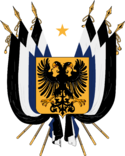Politics of Vierzland
Politics of Vierzland Politisches System Vierzlands | |
|---|---|
 | |
| Polity type | Federal parliamentary republic |
| Constitution | Constitution of Vierzland |
| Legislative branch | |
| Name | Federal Assembly |
| Type | Unicameral |
| Meeting place | Palace of Honour |
| Presiding officer | Eva Weiskopf, President of the Federal Assembly |
| Executive branch | |
| Head of State and Government | |
| Title | Chancellor |
| Currently | Kaspar Vahl |
| Appointer | Federal Assembly |
| Cabinet | |
| Name | Federal Council |
| Current cabinet | Second Vahl cabinet |
| Leader | Chancellor |
| Deputy leader | Deputy Chancellor |
| Appointer | Chancellor |
| Headquarters | Chancellery Werner Court |
| Ministries | 14 |
| Judicial branch | |
| Name | Judiciary of Vierzland |
| Courts | Courts of Vierzland |
| Supreme Federal Court | |
| Chief judge | Thortsten Hopfer |
| Seat | House of Justice |
| High Criminal Court | |
| Chief judge | Dieter Loeb |
 |
|---|
| This article is part of a series on the politics and government of Vierzland |
The politics of Vierzland take place in the framework of a federal, parliamentary republic. The Constitution of Vierzland, signed and ratified in 1992, outlines the system of government of the Vierz Federation.
The Chancellor of Vierzland is the head of government and, since 1997, the head of state, serving as the chairman of the Federal Council of Vierzland. The legislature, the 745-member Federal Assembly of Vierzland, elects the chancellor, approves the appointment of ministers, and makes federal law. The judicial branch is overseen by the independent Federal Judicial Office and topped by the Supreme Federal Court and the High Criminal Court.
Vierz politics de jure operate within a multi-party system, with the constitution guaranteeing the existence of pluralist democracy. Nonetheless, Vierzland has been designated as an "impartial democracy" by international observers due to the occasional persecution of journalists and unfair restrictions placed on opposition groups since 2012 by the ruling National Democratic Party. Vierz politics have been dominated by the centre-left Democratic Labour Party of Vierzland and the right-wing National Democratic Party since 2000.